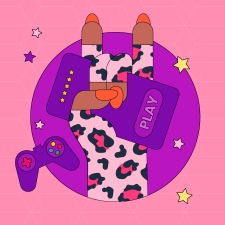Mobile advertising company Liftoff has invited inspirational women working on some of the biggest mobile games to discuss their achievements, challenges and future aspirations. This time the focus is on Janice Gao, Director of Growth Marketing at Big Fish Games.
Whether it’s a multi-million powerhouse like Genshin Impact or a new match three title looking to enter the market, any mobile game hoping to thrive in today’s competitive landscape needs a robust marketing strategy. That means understanding how to acquire new users, sustain growth, and identify new monetisation opportunities.
One person who can testify to that challenge is Janice Gao, Director of Growth Marketing at Big Fish Games. She is responsible for leading a team of growth marketers that work tirelessly to acquire new users and generate revenue across Big Fish Games’ portfolio, which includes casual hits such as Evermerge and Cooking Craze.
It’s not been easy for Gao to get where she is today; she spent over eight years nurturing her passion and honing her craft in the industry. She says the secret behind her success was keeping an open mind, being curious, and surrounding herself with people who’ve helped her learn the right lessons consistently.

Gao’s international mobile marketing journey
Gao’s decade-long journey into mobile marketing took her across the globe. Inspired by her favourite TV show, Mad Men, Gao set off to New York after graduating from the University of Electronic Science and Technology in China to pursue her marketing dreams.
After acquiring her MBA in marketing at Hofstra University, Gao worked in various marketing roles in health, finance, fashion and others. It wasn’t long before she landed her first big role as a Digital Marketing Specialist at a marketing agency in Seattle.
Her experience there opened up an opportunity for Gao to take her first step into mobile marketing by becoming a User Acquisition Manager for DoubleDown Interactive. While her knowledge of video games wasn’t expansive, she already had experience managing, executing and scaling search, social media, and organic campaigns.
“I quickly realised gaming is a great choice of entertainment compared to other mediums,” Gao says. “The level of creativity and freedom that users experience is so vivid, dynamic and personal, making it far more unique to work with from a marketing standpoint. Gaming is now more mainstream than ever, with more diverse audiences. That evolution provides many opportunities for marketers, which is why I think this is such an exciting and fulfilling industry to work in.”
Managing a growth and user acquisition team
Gaming is now more mainstream than ever, with more diverse audiences. That evolution provides many opportunities for marketers, which is why I think this is such an exciting and fulfilling industry to work inJanice Gao
Two years later, Gao found her way to Big Fish Games, her home for almost four years. Her skillset and knowledge have evolved significantly during that time, leading her to receive three different promotions, culminating in her current role as Director of Growth Marketing.
“The number one thing that helped me to progress was being open-minded,” Gao says. “The mobile market moves very quickly, and whatever worked one year ago might not be the best solution anymore. By being open to the opinion of others, especially those from other business functions, you can widen your perspective, increase your knowledge and identify all-new ways of achieving your goals.”
At the moment, Gao’s main responsibility is building a culture where her team delivers exceptional performance-based marketing results. That involves working with different stakeholders to determine how Big Fish Games can increase their marketability, particularly in games at various life stages. For example, a title going through its initial beta requires a different strategy to a game that’s been on the market for many years to achieve its maximum potential growth
“What we’re working with is always very different. There isn’t a playbook to follow, and that’s exactly where this industry's beauty comes from,” Gao says. “Figuring out how to solve a problem gives me a lot of motivation and passion, just like levelling up in games.”
Another key aspect of Gao’s role is managing Big Fish Games’ Creative Framework. In the past, success in this area was highly dependent on understanding user data, but increased privacy regulations restrict the information available to mobile marketers. Results now hinge on knowing what motivates users to keep playing.
“Understanding demography and player motivations helps us develop in-game concepts that tie directly into what our users care about,” Gao says. “What do they enjoy most about each level? What are the features that stand out most to each user? Those are the product aspects we should integrate into our thinking; it should be more than just marketing.”
The importance of gender diversity in mobile marketing
One of the notable things that thousands of casual games on the mobile market share is that their core audience is primarily female. To put that into perspective, according to GameRefinery, the majority of the highest-casual games right now are favoured by female players, including Candy Crush Saga (70%), Disney Emoji Blitz (72%), Gardenscapes (63%) and Monopoly GO! (63%).
“Like so many other casual game developers, our core audience is mostly women, which is why it’s so important that women have a strong voice when it comes to presenting ideas and making decisions,” Gao says. “Having that gender diversity on the team means we are certain that we’re generating ideas that best serve the interests of our users.”
Gao’s career path coincided with the steady rise in popularity of the mobile gaming industry. When Gao began her marketing career in 2011, the industry was estimated to be worth around $74 billion. Following its boom in popularity during the COVID-19 pandemic, gaming is estimated to be worth more than $321 billion by 2026, a rise of more than four times its value just a decade ago.
Despite that, women only make up a small percentage of the gaming workforce. According to Gao, the problem lies in accessibility. Gaming was never presented to her as a profession, and while some progress has been made, there is still much more the industry could be doing to encourage others to be a part of it.
“Promoting gaming as a career choice for women can be likened to a classic marketing funnel,” Gao says. “The first step is to raise awareness of how the gaming industry works and what different roles look like, from marketing to coding, through articles like this one, as it will inspire others to learn more. This is a rewarding, meaningful and exciting industry to be a part of, and we should be telling everyone about it.”





















